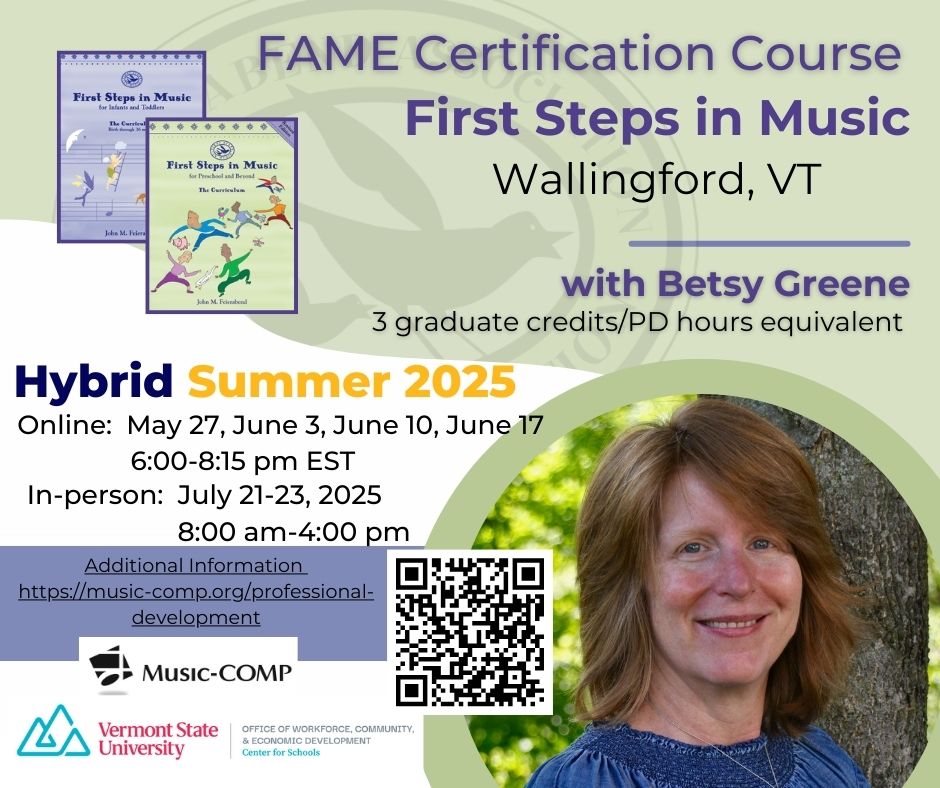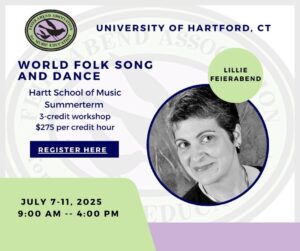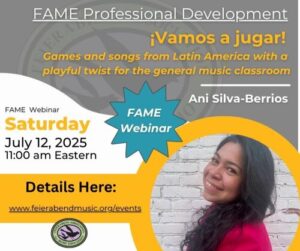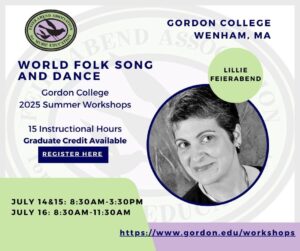Welcome to the FAME Events page!
View a full calendar of upcoming FAME teacher certification course classes and workshops.
The First Steps in Music curriculum is designed to prepare children to become musical in by being Tuneful, Beatful, and Artful. First Steps in Music for Infants and Toddlers provides developmentally appropriate activities that are well suited for children under three years old with their caregivers. First Steps in Music for Preschool and Beyond provides activities for children as young as three, but are appropriate for any aged child that needs to further develop their tuneful, beatful, and artful abilities. Folk songs and rhymes as well as classical music are the primary source materials that are used to develop their musical minds and abilities. Created by Dr. John Feierabend, this pedagogical approach contains everything you need to lead a music class for preschool and early elementary students, including Echo Songs, Call-and-Response Songs, Simple Songs, SongTales, Action Songs, Circle Games, Beat Motion Activities, and more. Ample time will be spent on exploring complete lesson plans for a three-year curriculum. Participants who successfully complete this course will receive an official certificate of completion from the Feierabend Association for Music Education.
First Steps in Music Certification Course HYBRID with Betsy Greene
Online & Wallingford, VT
Online: May 27, June 3, June 10, June 17 6:00-8:15 pm EST
In-person: July 21-23, 2025 8:00 am-4:00 pm EST
3 Graduate Credits Available
Seats are limited
![]() World Folk Song and Dance with Lillie Feierabend | The Hartt School of Music – West Hartford, CT
World Folk Song and Dance with Lillie Feierabend | The Hartt School of Music – West Hartford, CT
Humor, love, kindness, and joy are universal. Community music-making builds a bridge where we are offered a glimpse into another culture and are delighted to find ourselves looking back. A country’s musical culture can also offer insight into its history, spirit, values, and heart. We can appreciate and begin to know a little about people when we move in their footsteps, sing their songs, and play their games. These delightful gifts, traversing not only cultures but generations, can lead to greater awareness and global understanding. 3 credit workshop @$275 per credit.
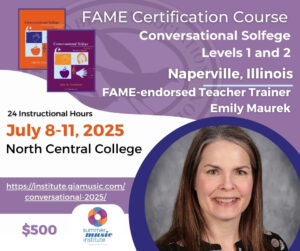 Conversational Solfege 1 & 2 Certification with Emily Maurek
Conversational Solfege 1 & 2 Certification with Emily Maurek
Course Description
Join FAME for a special webinar event with Ani Silva-Berrios
¡Vamos a jugar!
Games and songs from Latin America with a playful twist, for the general music classroom.
FAME membership has its perks, like this free webinar!
To attend this live webinar event, log in to your FAME membership account by navigating to Membership —> Member Page or log in using the button below.
YES! This event will be recorded.
A webinar recording will be available for FAME members after the event.
About the Presenter
Ani Silva-Berrios is an experienced music educator currently teaching K-5 general music in Virginia. She has previously taught K-6 general music and 5th-6th grade choir in Kansas, as well as K-5 general music in Florida. In addition to her work in elementary schools, Ani has taught undergraduate and graduate-level elementary music methods courses at institutions such as Missouri Western University, the University of Missouri-Kansas City Conservatory, and Vandercook College. An active presenter and clinician, she has shared at national and regional conferences, including the American Orff-Schülwerk Association, Ohio Music Educators Association, Virginia Music Educators Association, Florida Music Educators Association, Kansas Music Educators Association, and local Orff-Schülwerk chapters. Ani is the author of ¡Vamos a jugar!, a music teacher resource featuring Latin American songs, movement activities, and children’s literature designed for K-5 general music classrooms. She holds a dual bachelor’s degree in Music Education and Flute Performance from the University of Central Florida and a master’s degree in Music Education with a Kodály emphasis from the Hartt School of Music. During her time at Hartt, Ani earned Kodály certifications with John Feierabend and certifications in “First Steps in Music” and “Conversational Solfege.” She also completed her Orff-Schülwerk certification at the University of Memphis and holds a World Drumming Level 1 certification. Ani’s teaching philosophy blends many resources to create a playful, inclusive, and culturally rich classroom environment. Outside of teaching, she enjoys crafts, dancing, traveling, and spending time with her husband, Juan Berrios, a professional musician and educator.
![]() Conversational Solfege Level 1&2 Certification with John Feierabend | Gordon College, Wenham, MA
Conversational Solfege Level 1&2 Certification with John Feierabend | Gordon College, Wenham, MA
Through carefully sequenced activities, Conversational Solfege™ addresses the National Standards, while enabling students to joyfully assimilate the skills and content necessary to become musically literate, including the acquisition of listening, rhythmic and melodic reading, dictation, composition, and improvisation in an intuitive manner. Applications of Conversational Solfege™ are ideally suited to: elementary general music curricula; choral organizations at all levels; Orff Schulwerk; Kodály; Dalcroze; Gordon Music Learning Theory; high school and college sight singing and ear training; class piano; Suzuki; as well as recorder, band, and orchestral instrumental instruction.
The Feierabend Curriculum examines a pedagogical method that develops music literacy. Based on models used to teach conversational foreign languages, this course develops an understanding of music through the use of rhythm and tonal syllables at a “conversational” level that gradually evolves into reading, writing, improvisation, and composition skills. This is a literature-driven curriculum. The sequencing of musical elements grows out of those tonal and rhythmic elements that exist in folk song literature. Each rhythm or tonal element is explored in patterns, songs, and themes from classical literature. Applications of conversational solfege range from elementary general and choral music courses to collegiate level choral, sight-singing, and ear-training courses.
Participants who successfully complete this course will receive an official certificate of completion for Conversational Solfege Level 1 & 2 from the Feierabend Association for Music Education (FAME).
Suggested Texts and materials for Course:
Conversational Solfege Level 1 Teacher’s Edition, and Conversational Solfege Level 1 CD/ mp3 file
Conversational Solfege Level 2 Teacher’s Edition, and Conversational Solfege Level 2 CD/ mp3 file
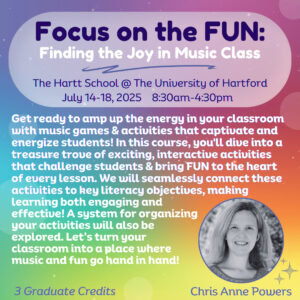
Course Description
3 Graduate Credits
![]() World Folk Song and Dance with Lillie Feierabend | Gordon College, Wenham, MA
World Folk Song and Dance with Lillie Feierabend | Gordon College, Wenham, MA
Humor, love, kindness, and joy are universal. Community music-making builds a bridge where we are offered a glimpse into another culture and are delighted to find ourselves looking back. A country’s musical culture can also offer insight into its history, spirit, values, and heart. We can appreciate and begin to know a little about people when we move in their footsteps, sing their songs, and play their games. These delightful gifts, traversing not only cultures but generations, can lead to greater awareness and global understanding.
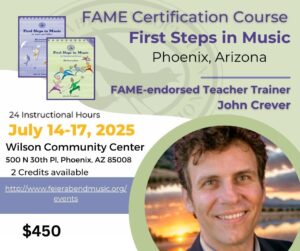
First Steps in Music Certification with John Crever in Phoenix, AZ
July 14 – 17, 2025
Get more details on the REGISTRATION PAGE
![]() Beyond the Classroom: Musical Bridges to the Community | Gordon College, Wenham, MA
Beyond the Classroom: Musical Bridges to the Community | Gordon College, Wenham, MA
Music Educators plant seeds for a lifetime of music making, but teachable moments do not always happen in the classroom. By providing opportunities outside of the music classroom, we also make them available to our families, faculty, school, and community. When invited to participate, they become invested in not only the child’s development but the growth of the music program, as well. It is our job to create opportunities for all members of our community to become involved with music on a continuous and consistent basis throughout the day, the month, and the year. This session will share a dozen ways to enrich the musical growth and development of your students, your school and your community, help create bonds and foster relationships, and provide opportunities that just may capture the soul of the young child for a lifetime.
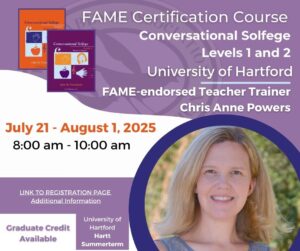 Conversational Solfege 1 & 2 Certification with Chris Powers
Conversational Solfege 1 & 2 Certification with Chris Powers

